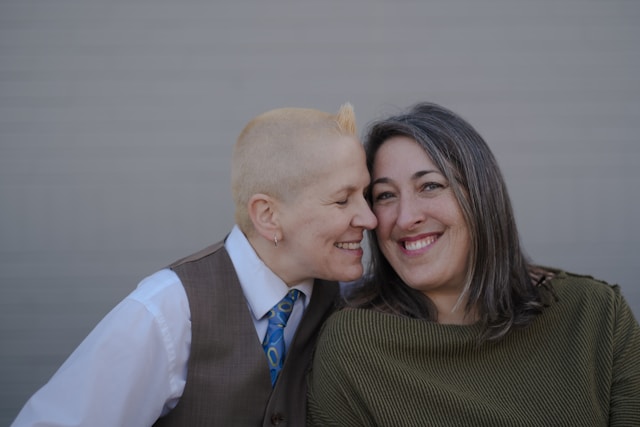Real connection isn’t the result of endless grand gestures or matching holiday outfits.

In reality, it’s built on mundane moments, honest questions, and a willingness to keep learning each other even after years together. The strongest marriages aren’t completely conflict-free, but they’re full of curiosity, emotional safety, and conversations that evolve as life does. Here are some of the conversations couples keep coming back to—not because they’re easy, but because they make everything else stronger.
1. What does partnership actually look like to you?

It’s one of those words everyone uses, but rarely defines. For some, it means sharing housework. For others, it’s about emotional support, big decisions, or knowing someone has your back when life gets heavy. Getting specific about what partnership looks like day-to-day helps clear up assumptions early on.
When both people understand what the other expects and needs, the relationship starts to feel more like a team and less like a balancing act. This one question can clear up years of low-key frustration and help you build a shared rhythm that actually works.
2. How do you handle stress, and what do you need when you’re in it?

Stress makes people weird. It changes how they speak, how they listen, how they connect. One person might get quiet and withdrawn. The other might get irritable or distracted. If you don’t talk about what stress looks like for each of you, it’s easy to misread it as rejection or distance.
Strong couples name their stress responses early, and they talk about what actually helps, whether that’s space, reassurance, distraction, or just silence without pressure. It stops a bad day from turning into a bad dynamic.
3. What kind of life do we actually want to build?

This goes beyond career goals or where you want to live. It’s about rhythm, pace, values. Do you want a full calendar or lots of quiet time? Do you want to grow things slowly or make bold moves? What does success look and feel like for each of you?
When you stop assuming your version of a good life is the same, you create space for something even better: a life that reflects both of you. Vision brings alignment, even when the path gets messy.
4. How do we each define loyalty?

Loyalty isn’t one-size-fits-all. For one person, it’s emotional availability. For another, it’s defending each other in front of other people. For some, it’s privacy. For others, transparency. If you never talk about it, you risk hurting each other without even realising it. Strong couples talk about what loyalty looks like in practice, not just theory. It’s not just what you avoid; it’s how you consistently show up, even in small, quiet moments.
5. What did we learn about money growing up, and how does it still shape us?

Money isn’t just numbers—it’s stories. It’s fear, safety, freedom, identity. One of you might be a saver, the other a spender. One might avoid talking about money altogether. If you never unpack where those habits come from, you’ll keep having the same arguments with different labels.
This conversation isn’t about budgeting. It’s about understanding the emotional backdrop behind every financial choice you make. That’s where trust starts.
6. What does intimacy mean to you beyond what happens in the bedroom?

Everyone talks about chemistry, but long-term intimacy is something else entirely. It might be touch. It might be shared vulnerability. It might be inside jokes or honest feedback or holding hands while folding laundry. It’s deeply personal, and deeply important to talk about. When you understand how your partner feels loved, not just how they express it, you’re far more likely to stay emotionally aligned even when life gets loud or heavy.
7. How do we argue, and how do we come back from it?

Every couple fights. The question is: what happens next? Do you need space to cool down or closeness to feel safe again? Do you raise your voice or go quiet? What does repair look like for you? Talking about how conflict feels, not just what causes it, helps avoid spirals that last way longer than they need to. Strong couples don’t avoid tension. They just get better at moving through it together.
8. What does being supported actually look like to you?

You might think you’re being helpful, offering advice, solutions, suggestions. However, if your partner just wanted to vent and be heard, you’ve missed the mark. Support isn’t one-size-fits-all. It’s specific, and it changes over time. This conversation keeps you tuned in. It makes sure your help is landing the way you intended, instead of creating more distance in the name of being “useful.”
9. What makes you feel seen in this relationship?

Everyone wants to be appreciated, but what actually makes your partner feel noticed? Is it a compliment? A thoughtful gesture? Remembering how they take their coffee? You won’t know unless you ask. Strong marriages are made in the moments where people feel deeply recognised. Not for what they do, but for who they are, even when they’re not trying to be impressive.
10. What are our personal and shared non-negotiables?

Boundaries aren’t walls; they’re clarity. What’s essential for you to feel respected, safe, or yourself in the relationship? What things can’t you bend on, even for someone you love? When you lay your non-negotiables on the table, you don’t box each other in. In fact, you set each other free. There’s nothing more grounding than knowing where the lines are, and trusting they’ll be respected.
11. What does quality time actually mean for each of us?

Just being in the same room doesn’t always count. One person might want conversation. The other might want to share an activity. One might crave deep connection. The other just wants stillness together. Both are valid, but they’re not the same. This conversation helps prevent one person feeling disconnected while the other thinks everything’s fine. It lets you create time that actually lands as closeness, not just proximity.
12. What habits keep us emotionally close when life gets busy?

Connection doesn’t always come naturally in the middle of work, errands, and daily noise. However, little rituals—check-in questions, shared playlists, post-dinner walks—can keep the thread strong. Talking about what habits matter helps you protect them. Because it’s rarely the big stuff that holds a marriage together. It’s the small stuff you do on purpose.
13. How do we stay a united front when other people challenge us?

Whether it’s family tension, friendship drama, or a weird work situation—outside stress can creep into a relationship fast. Knowing how to protect the bond when the world is testing you is huge. It’s not about pretending to agree on everything. It’s about having each other’s back, even when the situation’s messy. The best couples learn how to stay connected through tension, not just when it’s easy.
14. How do we talk about changes in sex and affection without pressure?

Every long-term relationship will go through changes in desire, frequency, or comfort. Life happens. Bodies change. Stress steals energy. And yet, very few couples talk about it openly. Normalising this early, and checking in regularly, makes it easier to adapt without guilt or distance. Intimacy isn’t just about what’s happening physically. It’s about how safe it feels to be honest, even when things are changing.
15. What do we want our home to feel like?

This isn’t about decor. It’s about energy. Do you want a calm, quiet home or one that’s full of noise and activity? Do you need routines or flexibility? Structure or spontaneity? When couples talk about the atmosphere they want to live in, everything else gets easier because your space starts supporting your relationship, not draining it.
16. How do we recharge, and how can we support each other’s process?

One person might need silence. The other needs conversation. One recharges by being alone, the other by being together. When you understand each other’s reset habits, it’s easier to not take things personally. This conversation helps you respect each other’s rhythms. And that respect creates way more space for patience, empathy, and breathing room in the relationship.
17. What makes this relationship emotionally safe for you?

Can you be vulnerable without it being used against you later? Can you bring up hard things and still feel loved? Emotional safety is the foundation of real intimacy, and it’s not automatic. It’s built. Ask each other what helps, and what doesn’t. This one conversation can change everything about how honest, open, and trusting the relationship feels.
18. What dreams do we still want to chase, individually and together?

It’s easy to get caught up in routines and forget that dreaming is part of connection too. Talking about what still lights you up, even if it’s different from your partner, keeps the relationship alive. You don’t have to have the same goals. But cheering each other on and staying curious about each other’s evolution is what helps you grow side by side instead of growing apart.
19. How have we handled change in the past, and what helped us through?

Whether it’s job changes, loss, parenting, illness, or something else, life will throw curveballs. Reflecting on the times you got through them together can remind you of your strength. This isn’t just nostalgia. It’s resilience in action. When couples reflect on their past teamwork, they feel more grounded and less shaken by whatever comes next.
20. What kind of legacy do we want to leave behind together?

Legacy doesn’t have to mean kids or money. It can mean values. Energy. Memories. Impact. How do you want to be remembered by friends, by family, by each other? This conversation zooms out and helps you see your relationship as something bigger than day-to-day logistics. It’s not just about surviving together. It’s about building something that lasts—for you, and beyond you.




